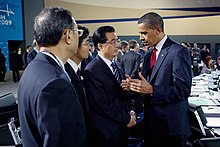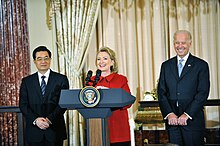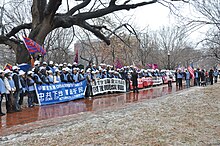Hu Jintao
Influential sponsors from the older generation promoted his rapid rise, including Song Ping, Hu Yaobang, Deng Xiaoping, and Jiang Zemin.
Along with his colleague Chinese premier Wen Jiabao, Hu presided over nearly a decade of consistent economic growth and development that cemented China as a major world power.
He sought to improve socio-economic equality domestically through the Scientific Outlook on Development, which aimed to build a "Harmonious Socialist Society" that was prosperous and free of social conflict.
Under his leadership, the authorities also cracked down on social disturbances, ethnic minority protests, and dissident figures, which also led to many controversial events such as the unrest in Tibet and the passing of the Anti-Secession Law.
[19][1] His mentor, Song Ping, was transferred to Beijing as Minister of Organization of the Chinese Communist Party, and was in charge of senior cadres' recommendation, candidacy and promotion.
Minor clashes had been occurring since 1987, and when the scale of unrest grew, Hu responded with the deployment of some 1,700 People's Armed Police into Lhasa in February 1989 in an attempt to warn against further disturbance.
In addition, there was speculation that Hu delayed his orders to clamp down on the protesters until late into the evening, when the police chief was forced to act because the situation was spiraling out of control.
[25] Martin Seiff of United Press International commented on Putin and Hu: "Both are tough and able authoritarians who had extensive experience of repressing dissent on their rise to the top.
His third and final selection, Jiang Zemin, won Deng's continued, although ambiguous, backing and was the only general secretary in Communist Chinese history to voluntarily leave his post when his term ended.
Following strong criticism of China for initially covering up and responding slowly to the crisis, he dismissed several party and government officials, including the health minister, who supported Jiang, and the Mayor of Beijing, Meng Xuenong, widely perceived as Hu's protégé.
[41][40] After taking over, Hu and Wen proposed to set up a Harmonious Society which aimed at lessening inequality and changing the style of the "GDP first and Welfare Second" policies.
[50] Hu emphasized an international relations premise of "shared responsibility": China would contribute to global common good, but it must not adversely affect its core interests in doing so, and its commitments must be conditional to those of other nations.
Chen Shui-bian and the Democratic Progressive Party (DPP) had continued to express an ultimate goal of de jure Taiwanese independence, and made statements on the political status of Taiwan that the PRC considers provocative.
In March 2005, the Anti-Secession Law was passed by the National People's Congress, formalizing "non-peaceful means" as an option of response to a declaration of independence in Taiwan.
[53]: 138 The increased contacts culminated in the 2005 Pan-Blue visits to mainland China, including a historic meeting between Hu and then-KMT chairman Lien Chan in April 2005.
On 12 April 2008, Hu Jintao met with Taiwan's vice president-elect Vincent Siew in the latter's role as chairman of the Cross-strait Common Market Foundation during the Boao Forum for Asia.
[63] At the closing ceremony of the 20th CCP National Congress on 22 October 2022, Hu, who had been sitting next to Xi, was pulled from his seat and escorted out of the hall by two men in suits and with name badges.
[74] Hu Jintao appeared in public alongside Xi Jinping on 5 December 2022, attending the farewell ceremony before Jiang's body was cremated in Babaoshan Revolutionary Cemetery.
[77] In foreign policy, Hu's critics say that his government was overly aggressive in asserting its new power, overestimated its reach, and raised the ire and apprehension of various neighbours, including Southeast Asian countries, India, and Japan.
[78] Domestic critics, including the country's elites, intellectuals, and particularly dissidents, point to various shortcomings of the Hu administration and his failure in implementing his signature "Socialist Harmonious Society" policy.
While there were some attempts to increase transparency in the expenditures of official organs and bureaucrats, deeply entrenched systemic issues that were contributing to the growth of corruption remained unresolved.
Although in the early years of his tenure Hu attempted to pioneer a form of "intraparty democracy" that called for greater participation from lower-ranked members to determine policy and select the leadership, there was little evidence of meaningful changes to the party's governing structure and decision-making process.
Some called China's political landscape during Hu's era one of "nine dragons taming the water" (九龙治水), that is, nine PSC members each ruling over their own fief.
In addition, Hu not only faced a profusion of special interest groups and political factions within the party, his ability to implement a cohesive program was also constrained by the influence of former leader Jiang Zemin.
[76] Hu also won praise for stepping down as military chief in favour of his successor Xi Jinping, and at the same time relinquishing his position as general secretary.
What emerges from these philosophies, in Hu's view, is a country with a systematic approach to national structure and development that combines dynamic economic growth, a free market energized by a vigorous "nonpublic" (i.e., private) sector, heavy-handed political and media control, personal but not political freedoms, concern for the welfare of all citizens, cultural enlightenment, and a synergistic approach to diverse social issues (the Scientific Development Perspective) that lead, in Hu's vision, to a "Harmonious Socialist Society".
[42] Hu's pragmatic, non-ideological agenda had two core values—maintaining social stability to further economic development and sustaining Chinese culture to enrich national sovereignty.
In the speech Hu used a very populist tone to appeal to ordinary Chinese, making serious note of the recent challenges China was facing, especially with regards to income disparity.
[86] In response to the great number of social problems in China, in March 2006, Hu Jintao released the "Eight Honors and Eight Shames" as a set of moral codes to be followed by the Chinese people, and emphasized the need to spread the message to the youth.
The codes differ from the ideologies of his predecessors, namely, Jiang's Three Represents, Deng Xiaoping Theory, and Mao Zedong Thought in that the focus, for the first time, has been shifted to codifying moral standards as opposed to setting social or economic goals.









